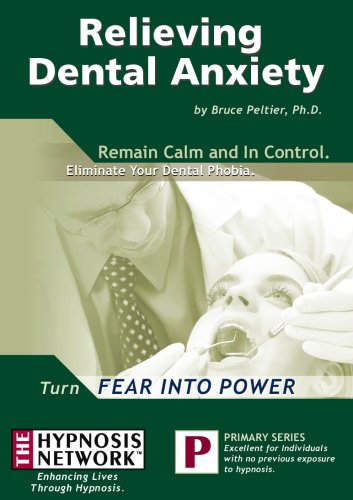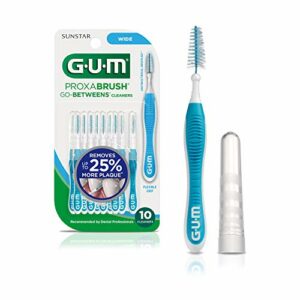Dental anxiety can be a real challenge for many people, making it difficult to communicate our fears and concerns to our dentist. In this step-by-step guide, we aim to help you overcome this hurdle by providing practical tips and strategies to effectively convey your dental anxiety to your dentist.
Conquer Your Dental Fears with These Bestsellers
Identify and acknowledge your dental anxiety
Reflect on your feelings and fears related to dental visits and acknowledge that you experience dental anxiety. Take a moment to think about how you feel before and during a dental appointment. Consider any specific fears or concerns you may have, such as the sound of the dental drill, the feeling of numbness, or the possibility of experiencing pain. This self-reflection will help you become aware of your dental anxiety and allow you to address it more effectively.
Research and choose a supportive dentist
To find a dentist who is understanding and supportive towards patients with dental anxiety, start by doing some research. Look for dentists in your area who specialize in treating patients with dental anxiety or who have positive reviews from patients who struggle with anxiety. Read through their websites or online profiles to get a sense of their approach and philosophy towards patient care. Additionally, you can ask for recommendations from friends, family, or healthcare professionals who may have had positive experiences with supportive dentists.
Schedule an initial consultation
To schedule an initial consultation, call the dentist’s office you have chosen. Explain that you would like to discuss your dental anxiety. Request an appointment for this purpose, providing your preferred date and time if possible.
Prepare for the consultation
Write down your concerns and questions about dental anxiety. This will help you organize your thoughts and ensure that you address all your worries during the consultation. By having your concerns and questions written down, you can better articulate them to your dentist and have a more productive and informative discussion.
Communicate your dental anxiety openly
During the consultation, express your dental anxiety openly and honestly to your dentist. Share your specific fears and concerns, so that they can better understand your needs and provide appropriate support. Be clear and concise in your communication, describing any past negative experiences or triggers that may contribute to your anxiety. Remember, your dentist is there to help and wants to ensure your comfort throughout the dental treatment process.
Discuss coping strategies and accommodations
To engage in a conversation with your dentist about coping strategies, relaxation techniques, or accommodations for dental anxiety, start by expressing your concerns and fears openly. Ask your dentist about potential coping strategies such as deep breathing exercises, listening to calming music, or using distractions during the procedure. Inquire about possible accommodations such as having a friend or family member present, using numbing gel, or taking breaks during the appointment. Remember, open communication with your dentist is essential in finding the most suitable strategies to ease your dental anxiety.
Develop a personalized treatment plan
Work together with your dentist to create a personalized treatment plan that considers your dental anxiety and caters to your specific requirements. Discuss your concerns openly and honestly, allowing your dentist to understand your needs better. By collaborating, you can develop a treatment plan that ensures your comfort and addresses any apprehensions you may have.
Ask about sedation options
To inquire about sedation options that can help you relax during dental procedures if necessary, follow these steps:
- Start by discussing your concerns and anxiety about the dental procedure with your dentist.
- Ask about the different types of sedation options available, such as nitrous oxide (laughing gas), oral sedation, or intravenous (IV) sedation.
- Inquire about the benefits and risks associated with each sedation option to make an informed decision.
- Seek clarification on the sedation process, including how it is administered, its effects, and the recovery time.
- Give examples of your level of anxiety or discomfort during dental procedures, so your dentist can better understand your needs.
- Finally, work with your dentist to develop a personalized sedation plan that addresses your concerns and ensures a comfortable dental experience.
Remember, open communication with your dentist is key to finding the most suitable sedation option for you.
Follow through with the agreed plan
- Attend all scheduled dental appointments and follow the agreed treatment plan, recognizing that your dentist is aware of your dental anxiety.
- Communicate openly with your dentist about your fears and concerns, allowing them to provide appropriate support and reassurance.
- Take advantage of relaxation techniques, such as deep breathing or listening to calming music, to help manage your anxiety during dental procedures.
- Ask your dentist to explain each step of the treatment process in detail, so you know what to expect and can mentally prepare yourself.
- Consider bringing a trusted friend or family member to accompany you during dental visits, providing additional emotional support.
- Remember that dental anxiety is common and that your dentist is experienced in helping patients with similar concerns. Trust that they will do their best to ensure your comfort and well-being throughout the treatment.
Provide feedback and make adjustments
To provide feedback and make adjustments, it’s important to communicate your experience to your dentist after each visit. Here’s how you can effectively provide feedback on managing your dental anxiety:
- Start by expressing your appreciation for any techniques or approaches that worked well in alleviating your anxiety during the visit.
- Then, kindly and constructively share any areas where you feel improvements could be made to further manage your dental anxiety. Be specific and provide examples if possible.
- Remember to be open and honest in your feedback, as it will help your dentist understand your needs better and make necessary adjustments for future appointments.
By sharing your experience and feedback with your dentist, you contribute to a collaborative approach in managing your dental anxiety and ensuring a more comfortable dental experience.
Finding comfort in vulnerability
In conclusion, we hope this guide has provided you with valuable insights on how to effectively communicate your dental anxiety to your dentist. We have discussed the importance of open and honest communication, as well as the various strategies that can help you express your fears and concerns. Remember, your dentist is there to support you and provide the best possible care, and by sharing your anxiety, you can ensure a more comfortable and stress-free dental experience. So, take a deep breath, gather your thoughts, and trust that your dentist will listen and understand. Together, we can overcome dental anxiety and maintain good oral health.
Overcoming Dental Fears
Overcoming Dental Anxiety: Tips and Techniques to Ease Your Worries
- Understand that dental anxiety is a common and valid feeling that many individuals experience
- Educate yourself about dental procedures and practices, as knowledge can help alleviate some fears
- Communicate openly with your dentist about your anxieties, allowing them to better understand your needs and concerns
- Consider relaxation techniques, such as deep breathing exercises or listening to calming music, to help manage anxiety before and during dental appointments
- Explore the option of sedation dentistry, which can help individuals with severe dental anxiety receive necessary treatments while feeling more at ease
Conquering Your Dental Anxiety: Frequently Asked Questions
Do you often feel anxious or fearful when it comes to visiting the dentist?
Yes, many people do feel anxious or fearful when it comes to visiting the dentist. It’s a common feeling that can be caused by various factors such as past negative experiences, fear of pain, or the unknown. We understand that going to the dentist can be a daunting experience for some, but it’s important to remember that dental care is crucial for maintaining good oral health. Dentists and their teams are trained to provide a comfortable and supportive environment for their patients. If you’re feeling anxious, it might help to communicate your concerns with your dentist beforehand, as they can offer techniques or options to help you feel more at ease during your visit. Remember, you’re not alone in feeling this way, and taking care of your oral health is an important step towards overall well-being.
Do you feel that your dental anxiety is understood and taken seriously by your dental healthcare providers?
Yes, we understand that dental anxiety can be a significant concern for many individuals. It is common for people to feel anxious or nervous about dental visits, and we acknowledge that these feelings are valid and should be taken seriously by dental healthcare providers.
We know that dental anxiety can stem from various factors, such as past negative experiences, fear of pain, or a general anxiety towards medical settings. It is essential for dental professionals to recognize and understand these fears, as they can greatly impact a person’s oral health and overall well-being.
While we cannot speak for everyone’s experiences, we believe that it is crucial for dental healthcare providers to create a safe and supportive environment for patients with dental anxiety. This includes taking the time to listen to patients’ concerns, explaining procedures thoroughly, and addressing any questions or fears they may have.
Dental professionals should also consider implementing strategies to help patients manage their anxiety, such as using relaxation techniques, providing distractions during treatment, or offering sedation options when necessary.
However, we acknowledge that not all dental healthcare providers may fully understand or address dental anxiety adequately. If you feel that your dental anxiety is not being taken seriously, we encourage you to communicate your concerns with your provider. Open and honest communication is key in establishing a trusting relationship and finding solutions that can help alleviate your dental anxiety.
















